Psoriasis is a chronic skin disease of non-infectious origin. According to statistics, 3. 7% of the world population has psoriasis. Folk call the disease "scaly lichen".
Psoriasis does not depend on sex, is not contagious; Usually develops between the ages of 14-27 years. The disease is characterized by the appearance of red scales in the form of patches (spots) covered with white scales. A spot (or several spots) can appear on any part of the body, but is most common in places where the skin is thin and dry: elbows, knees, lower back, scalp.
These nodules are of different sizes and disturbed in different ways: in some patients only skin irritation is noted; In other patients, large areas of skin are involved, accompanied by discomfort, itching, pain, insomnia, and reduced quality of life.
Psoriasis is a chronic disease, characterized by periods of flare (rash) and remission (relief of symptoms).
Psoriasis is often a complication of pregnancy.
Causes of Psoriasis
Psoriasis is a systemic process that involves not only the skin but the entire body. The causes of psoriasis are not fully understood, but it is thought that there are several of them: neurological (due to stress), genetic, infectious, viral, mixed (skin damage withstaphylococcal infiltration associated with any of the above), v. v . . . In this case, cellular and humoral immunity is activated and an autoimmune process that damages cells, mainly skin cells (epidermis), is activated.
In addition to the activation of immunity, metabolic processes are disturbed. The disease is aggravated by genetic burden. As a result, the process of cell renewal (regeneration) is accelerated by 3-5 times - psoriatic plaques form on the skin.
If not treated promptly, further damage: skin nodules with acne, cracked, festering; destroyed nails, involved joints, etc. v.
The quality of life of psoriasis patients is 80% dependent on timely diagnosis and proper treatment.
Again, we list the factors that contribute to the onset of the disease:
- bad genetics. Scientists have identified nine genes that determine the development of the disease, but their interactions are unclear. It is well established that in 15% of cases, psoriasis is inherited by relatives of the first and second generations;
- stress, nervous tension, depression. It has been shown that stress in 70% of cases causes exacerbations of psoriasis;
- hormone imbalance;
- biological disorders;
- metabolic disorders, drug addiction;
- colitis and parasitic infections (ringworm, lamblia, intestinal infections, etc. );
- viral infection;
- streptococcal disease; Candida infection of the skin;
- allergy.
Symptoms of Psoriasis
In the early stages, psoriasis skin rashes appear as red, scaly patches (spots) that fall off. The appearance of plaques on the skin is accompanied by intense itching. A denser layer (keratinization) is found under the scab.
Here are the 6 main forms of psoriasis; each has its own symptoms:
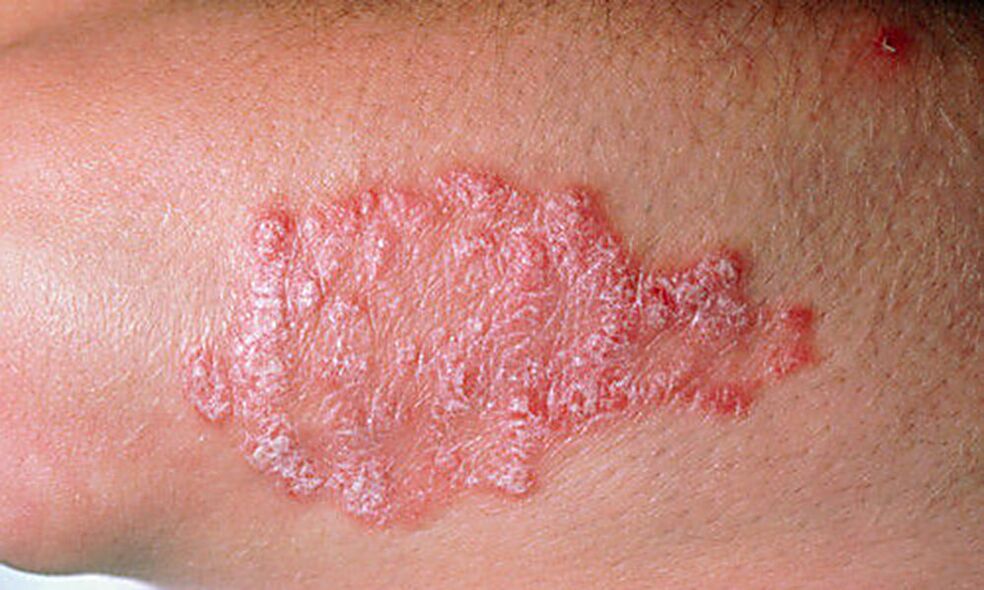
Plaque psoriasis occurs in 85% of patients. It is characterized by a dry, pink, raised rash on the skin covered with silvery scales. The skin in the affected areas is frequently scaly; In this place there are still red marks, bleeding when injured. In 60% of cases, arrays merge into large arrays.
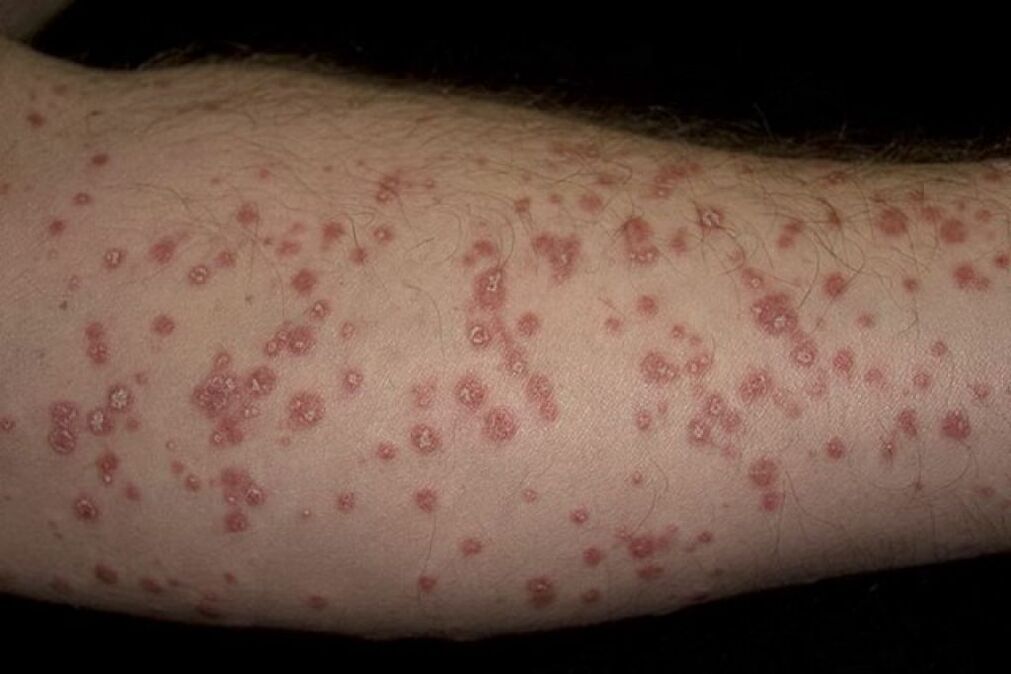
Intestinal psoriasis is characterized by numerous small, dry lesions in the form of raised pink drops on the surface of the skin. The rash is localized on the thighs and legs, affecting large areas of the body. In 60% of cases, guttate psoriasis gets worse after a strep infection.
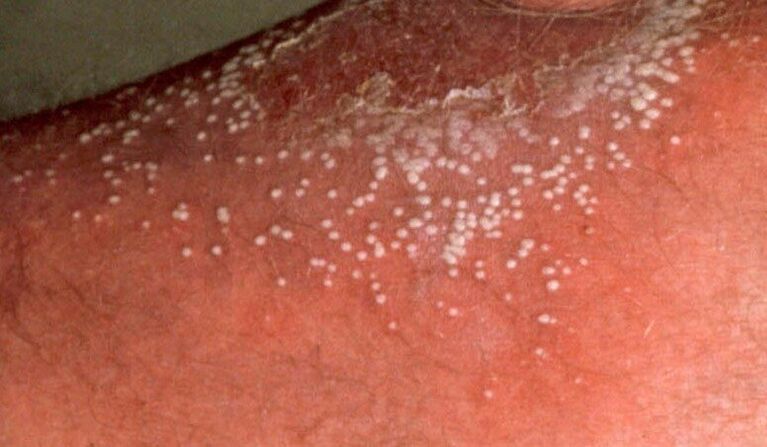
Pustular psoriasis can be recognized by the blisters on the skin filled with clear fluid. The blisters are covered with red, edematous peeling skin. Legs and thighs are more commonly affected.
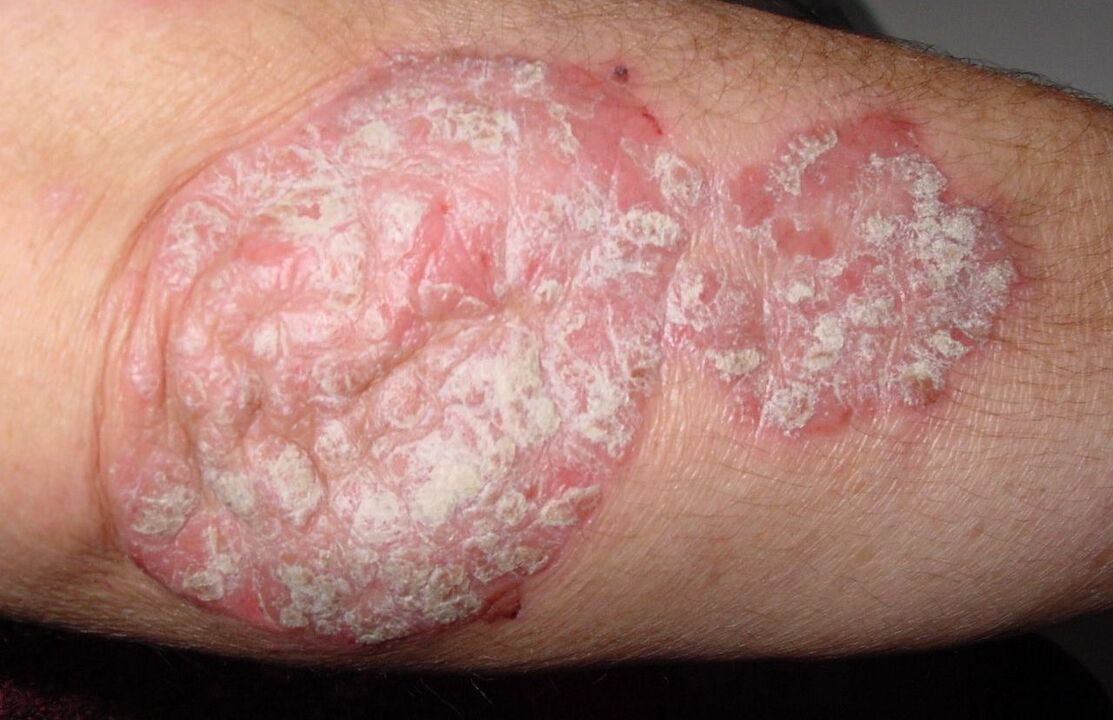
Superficial flexor psoriasis presents as smooth, non-scaly red nodules located in the folds of the skin: lateral thighs, armpits, and external genitalia. Due to mechanical irritation (physiological friction), the nodules are injured, bleed, and fester.
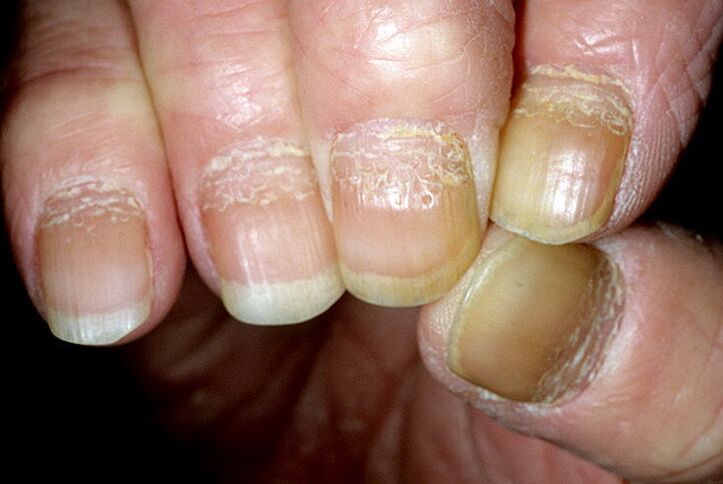
Psoriasis of the nails is manifested by discoloration, the appearance of spots and transverse lines on the nails. The skin around the lesion is hardened. As the disease progresses, the nails peel, thicken, and dry or fall off.
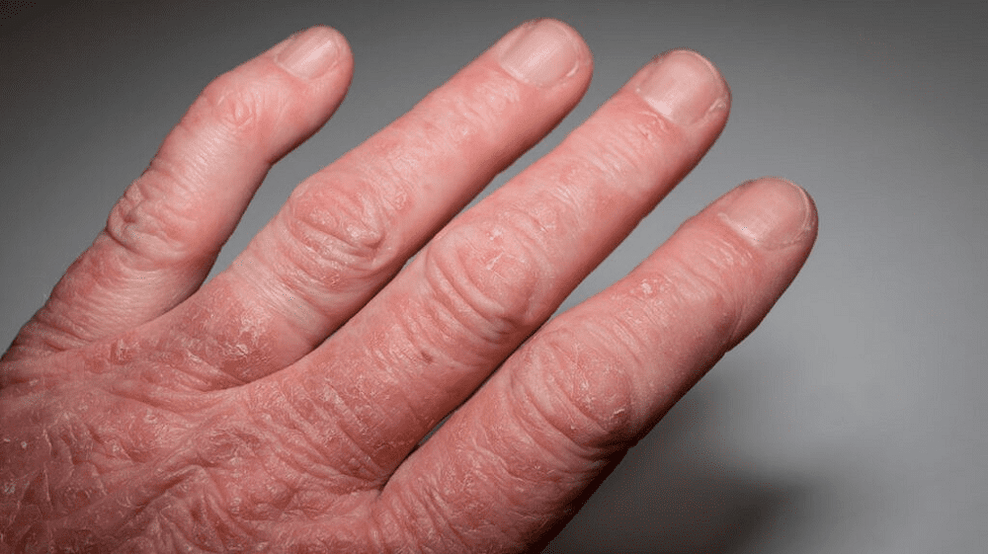
Psoriatic arthritis (15% of cases). Any joint is affected, but it is more common in the smaller joints - the joints of the hands and feet. The fingers become like sausages. Psoriasis of the joints leads to bursitis, disabling a person.
Let's talk about head and elbow injuries separately.
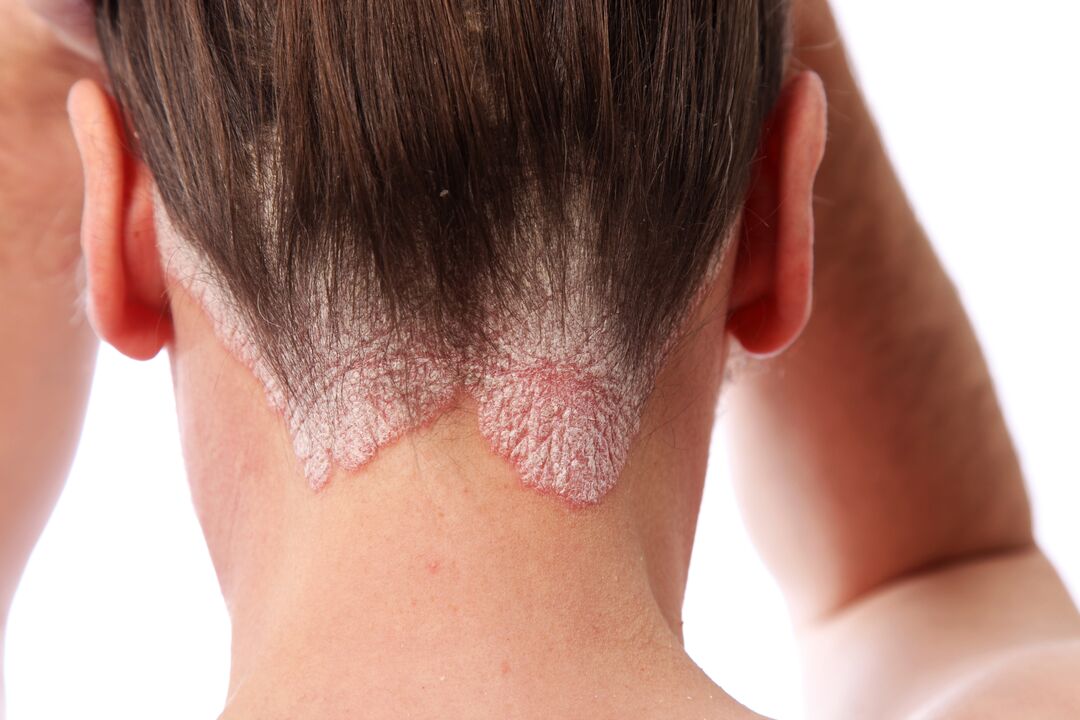
Scalp (primarily scalp) psoriasis is the most common form of the disease. It is more common at a young age. Symptoms are red, scaly patches that cause itching and discomfort. Red skin is almost always noticeable, so it causes discomfort and leads to a person's social isolation.
Elbow psoriasis is a disease of middle-aged people. It manifests as a rash on the extensor surface of the elbow joint. The rash spreads outward and coalesces - a large patch (plaque) is formed, covered with silvery scales that easily fall off. Along with the scab, a thin protective film is detached, exposing the bleeding surface. In 80% of cases, these bumps go away on their own without treatment, but sometimes they thicken (age) and persist for years, causing psoriatic lesions on the elbow joint.
Diagnosis of psoriasis
The diagnosis and treatment of psoriasis is done by a dermatologist.
Because of the characteristic skin lesions, the diagnosis of psoriasis is straightforward. As additional laboratory tests, general blood tests and rheumatoid factor determination are used. To diagnose psoriatic arthritis, a rheumatologist will prescribe a consultation and take X-rays of the affected joints. In rare cases, a skin biopsy is performed for the differential diagnosis.
Psoriasis should be distinguished from similar skin diseases: seborrheic disease, lupus, etc. v.
Treatment of psoriasis
Psoriasis is a chronic disease with periods of exacerbation (reappearance of skin rashes) and remission (disappearance of the rash). Psoriasis cannot be cured forever. You can prolong remission and reduce the intensity of exacerbations.
In only 40% of cases, an effective treatment can be found immediately. Sometimes it takes months, years. Therefore, psoriasis is treated at home, except for severe exacerbations and complications. The effectiveness of treatment is influenced by the type of psoriasis, age, comorbidities, etc. . . With a mild degree of psoriasis, topical preparations are prescribed: ointments and creams based on:
- glucocorticosteroids;
- zinc;
- Pitches;
- salicylic acid;
- vitamin D3.
In cases of severe psoriasis (25% of the skin surface affected, joint damage) and ineffective local treatment, complex therapy is indicated:
- cytostatics that inhibit epidermal cell division;
- immunomodulatory drugs normalize immune responses;
- glucocorticosteroids, which regulate metabolism and reduce inflammation;
- non-steroidal anti-inflammatory drugs (to relieve itchy skin);
- multivitamins.
Physiotherapy is prescribed: ultraviolet irradiation, cryotherapy, electrophoresis, hirudotherapy. Folk remedies are also used: ointments based on celandine and lard, meadowsweet grass and beeswax, beeswax and lard. To normalize immunity, they drink homemade kvass from oats, infusion of bay leaves and a decoction of dill.
Diet, especially with exacerbations of psoriasis, plays an important role. Spicy and sweet dishes are excluded from the diet. Fast food and alcohol are prohibited. The diet should be balanced, rich in vitamins and minerals.
To avoid flare-ups of psoriasis, you need to stay healthy, avoid stress, hypothermia, and seasonal illnesses.
Here are simple rules to prevent psoriasis flares:
- does not dry the skin excessively;
- avoid prolonged exposure to the sun;
- avoid skin wounds;
- avoid stress;
- Do not smoke or abuse alcohol.
Is psoriasis contagious?
There has not been a proven case of psoriasis transmission from family members or other contacts. Therefore, it is believed that psoriasis is not contagious.
Which doctor to contact?
To start treatment promptly and avoid the spread of psoriasis, consult a dermatologist. In the case of psoriatic arthritis, a consultation with a rheumatologist is indicated.

























